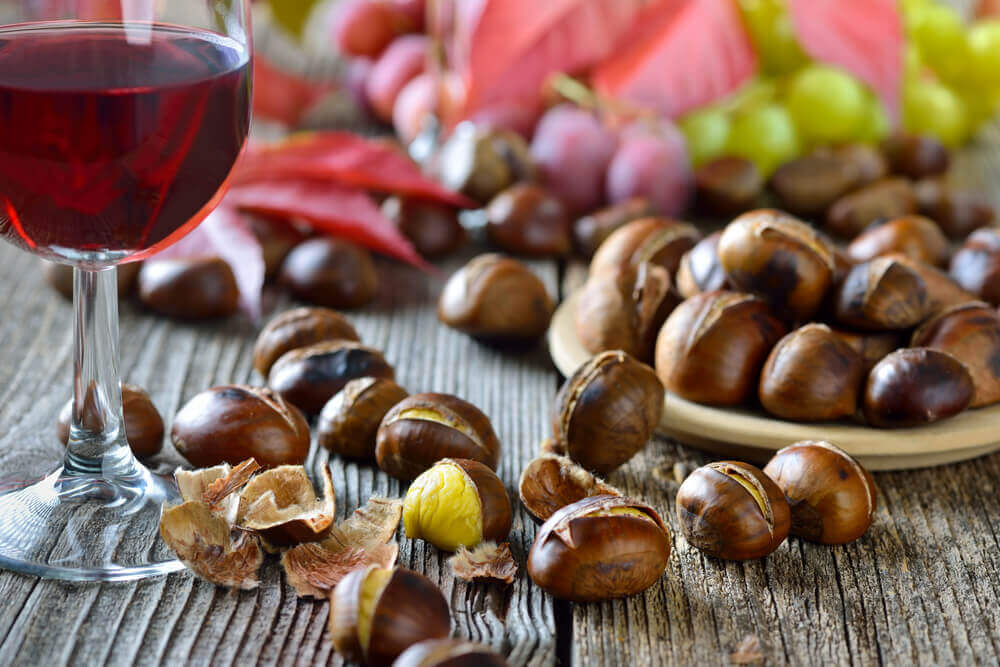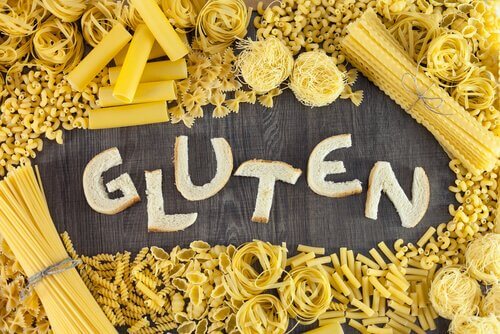10 Benefits of Chestnuts in Your Diet

Have you tried chestnuts, the nuts from the chestnut tree? This is a tree scientifically known by the name of Castanea sativa that belongs to the Fagaceae family and is grown in temperate climates typical of the northern hemisphere.
Although this nut is not part of the daily diet of many people, the benefits of chestnuts for health are several. Are you interested in discovering them?
The edible part of the chestnut is yellowish white, with a pleasant and sweet taste. The chestnut nut is a dry fruit that’s mainly eaten during the autumn and winter season.
It’s important to note that they shouldn’t be eaten raw. The reason is that they contain compounds —tannins— that can cause digestive disorders. However, beyond this recommendation, this is a food with many advantages for those who eat it regularly.
The properties of chestnuts
The main property of the chestnut is being low in calories, which goes well with its high amount of fiber, protein, and carbohydrates.
They’re also a great source of minerals. For example, magnesium, potassium, iron, and phosphorus.
Read this article too: Vitamins and Minerals that Fight Depression
Nutritional value
Every 100 grams of chestnuts has:
- 225 calories
- 40 grams of water
- 40 grams of complex carbohydrates
- 6 grams of fat
- 5 grams of vegetable protein
- 8 grams of fiber
- Likewise, they contain vitamin E and B complex vitamins (B1, B2, B3, B6, and B9).
10 benefits of eating chestnuts
1. Chestnuts are a food that satisfy your appetite

Looking for a way to calm your appetite? Chestnuts are a satiating food due to their fiber and carbohydrates.
- It’s a good idea to include them in your diet. However, don’t eat them in excessive amounts if you’re on a weight loss diet.
2. They strengthen your bone system
These tree nuts are a good source of calcium, phosphorus, and magnesium. Therefore, they help keep your skeletal system healthy and prevent premature osteoporosis, as stated in this study conducted by the University of Iowa (United States).
- Consume them regularly in their season as if they were a nutritional supplement.
3. They stimulate the functioning of the nervous system
The nervous system is very important since it’s in charge of controlling many parts of the body. Chestnuts are beneficial for the nervous system by providing your body with lots of antioxidants, which in turn helps you develop good mental health.
4. They’re good for people with diabetes

People diagnosed with diabetes can benefit from the consumption of chestnuts. The carbohydrates that this fruit gives us are slowly absorbed, so they don’t produce changes in insulin in the blood. This is confirmed by this study carried out by the University of South Australia.
- Therefore, the chestnut can be a healthy snack at any time of the day.
5. They contain amino acids
Chestnuts contain all of the essential amino acids for a healthy diet. Therefore, people who are on a vegan diet, older adults, and athletes can eat them without a problem.
- Therefore, eat two or three chestnuts before or after sports, and you will improve your endurance and recovery.
6. Chestnuts don’t contain gluten

Whether eaten as nuts or in a flour, this food is a good ally for people with celiac or gluten sensitivities. Therefore, you can benefit from them in several ways by eating them instead of wheat derivatives that contain gluten.
- We can also use chestnuts as flour to make pastries, drinks, sweets, etc.
7. They protect your cardiovascular health
Tree nuts are foods that help protect your heart and improve your quality of life, according to this study from the University of Loma Linda (California). Chestnuts have healthy fats and give you good amounts of omega 3 and omega 6 fatty acids.
- They also don’t have any cholesterol, making them a natural alternative that you should include in your daily diet.
8. They’re good for your digestion
Chestnuts have an excellent amount of fiber that has a positive effect on digestion.
- Also, this tree nut helps your bacterial flora be in favorable conditions to prevent constipation, as well as pain and diseases in your large intestine such as diverticulosis or colon cancer.
Check out this article too: 11 Foods that Affect Your Digestion and Lead to Constipation
9. Chestnuts are hypertensive

People with high blood pressure can eat chestnuts without a problem,as suggested by this study carried out by the Polytechnic Institute of Braganza (Portugal). This is because they’re low in sodium and high in potassium.
- Additionally, because of their diuretic effect, they’re beneficial for people who retain liquids.
10. Chestnuts provide a significant energy boost
Chestnuts are also useful in preventing or improving tiredness and fatigue. Therefore, in the case of people diagnosed with anemia, chestnuts can be of great help, thanks to their iron content.
- In addition, it’s recommended to consume them with fruits that contain vitamin C to achieve better assimilation of this mineral.
Finally, chestnuts aren’t just beneficial as diet components, but are also ideal for external treatments, such as skin or scalp care. You can use them when treating wounds, canker sores, and even reduce swelling and relieve sore throats.
All cited sources were thoroughly reviewed by our team to ensure their quality, reliability, currency, and validity. The bibliography of this article was considered reliable and of academic or scientific accuracy.
- Bodnaruc A, Prud’homme D, et al. Nutrition modulation of endogenous glucagon-like peptide-1 secretion: a review. Nutrition and Metabolism. 2016. 13:92.
- Borges, O., Gonçalves, B., de Carvalho, J. L. S., Correia, P., & Silva, A. P. (2008). Nutritional quality of chestnut (Castanea sativa Mill.) cultivars from Portugal. Food Chemistry. https://doi.org/10.1016/j.foodchem.2007.07.011
- Calderón Ospina C. A, Nava-Mesa C. O. B vitamins in the nervous system: current knowledge of the biochemical modes of action and synergies of thiamine, pyridoxine and cobalamin. Neuroscience and Therapeutics. Enero 2020. 26 (1): 5-13.
- Ciosek Z, Kot K, et al. The effects of calcium, magnesium, phosphorus, fluoride and lean on bone tissue. Biomolecules. Abril 2021. 11 (4): 506.
- Doan Kh, Ko Ch, et al. Gallic acid regulates body weight and glucose homeostasis through AMPK activation. Endocrinology. Enero 2015. 156 (1): 157-68.
- Durazzo, A., Turfani, V., Azzini, E., Maiani, G., & Carcea, M. (2013). Phenols, lignans and antioxidant properties of legume and sweet chestnut flours. In Food Chemistry. https://doi.org/10.1016/j.foodchem.2012.09.062.
- Federación Española de Nutrición (FEN). Castañas.
- Food Data Central. Nuts, chestnuts, European, raw, peeled. U. S. Department of Agriculture. Abril 2019.
- Kim Y, Keogh J. B, et al. Benefits of nut consumption on insulin resistance and cardiovascular risk factors: multiple potential mechanisms of action. Nutrients. Noviembre 2017. 9 (11): 1271.
- Mayo Clinic. Dietary fiber: essential for a healthy diet. Noviembre 2022.
- Sabaté J, Wien M. Consumption of nuts in the prevention of cardiovascular disease. Current Nutrition Reports. 2013. 2: 258-266.
- Vázquez, G., Fontenla, E., Santos, J., Freire, M. S., González-Álvarez, J., & Antorrena, G. (2008). Antioxidant activity and phenolic content of chestnut (Castanea sativa) shell and eucalyptus (Eucalyptus globulus) bark extracts. Industrial Crops and Products. https://doi.org/10.1016/j.indcrop.2008.03.003
- Wani I. A, Hamid A, et al. Physico-chemical, rheological and antioxidant properties of sweet chestnut (Castanea sativa Mill) as affected by pan and microwave roasting. Journal of Advanced Research. Julio 2017 8 (4): 399-405.
- Yang F, Huang X, et al. Amino acid composition and nutritional value evaluation of Chinese chestnut (Castanea mollissima Blume) and its protein subunit. Royal Society of Chemistry. 2018. 8: 2653-2659.
This text is provided for informational purposes only and does not replace consultation with a professional. If in doubt, consult your specialist.








